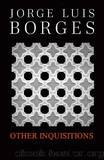Other Inquisitions, 1937-1952 by Jorge Luis Borges

Author:Jorge Luis Borges [Borges, Jorge Luis]
Language: eng
Format: epub
Tags: General Non-Fiction, Essays, Belles Lettres
Google: SuQSAAAAYAAJ
Publisher: University of Texas Press
Published: 1964-03-15T05:00:00+00:00
—Translated by James E. Irby
The Modesty of History
On the twentieth of September, 1792, Johann Wolfgang von Goethe (who had accompanied the Duke of Weimar to Paris on a military excursion) saw the finest army in Europe inexplicably repulsed at Valmy by some French militia, and he told his disconcerted friends: At this place and on this day a new epoch in the history of the world begins, and we shall be able to say that we were present at its beginnings. Ever since that day there has been a plethora of historical dates and days, and one of the tasks of modern governments (most notably in Italy, Germany, and Russia) has been to fabricate or counterfeit them, with the help of previously accumulated propaganda and of persistent publicity. Such “historic” dates, in which the influence of Cecil B. DeMille may be noted, bear less relation to history than to journalism. I have long suspected that history, true history, is far more modest, and that its essential dates may well be, for a long time, secret as well. A Chinese writer of prose has observed that the unicorn, for the very reason that it is so anomalous, will pass unnoticed. Our eyes see what they are accustomed to see. Tacitus did not perceive the Crucifixion, though his book records the event.
I was led to these reflections by a chance phrase which caught my eye as I leafed through a history of Greek literature and which interested me because of its slightly enigmatic nature. Here is the phrase: He brought in a second actor. I paused, verified the fact that Aeschylus was the subject of this mysterious action, and that, as is stated in the Fourth Chapter of Aristotle’s Poetics, he “raised the number of actors from one to two.” As we know, the drama was born of the Dionysiac religion; originally, a single actor, the hypocrite, made taller by the thick-soled buskin, the cothurnus, dressed in black or purple, his face made larger by a mask, shared the stage with the twelve members of the chorus. The drama was one of the ceremonies of the cult, and, as in all ritual, it ran the risk of some day being invariable. This could have happened, but that one day, five hundred years before the Christian era, the Athenians marveled to see, or were scandalized to see (Victor Hugo surmised the latter), the unannounced appearance of a second actor. On that day in some remote spring, in that honey-colored theater, what did those Athenians think, what did they feel? Perhaps neither stupor nor consternation; perhaps only the beginnings of surprise. From Cicero’s Tusctdanae Disputationes we know that Aeschylus entered the Pythagorean order, but we shall never know whether or not he foresaw, even though only imperfectly, the significance of the progressive passage from one to two, from unity to plurality, and thus on to infinity. Along with the second actor came dialogue and the indefinite possibilities of the reaction of some characters upon others.
Download
This site does not store any files on its server. We only index and link to content provided by other sites. Please contact the content providers to delete copyright contents if any and email us, we'll remove relevant links or contents immediately.
The Rules Do Not Apply by Ariel Levy(4969)
Bluets by Maggie Nelson(4556)
Too Much and Not the Mood by Durga Chew-Bose(4348)
Pre-Suasion: A Revolutionary Way to Influence and Persuade by Robert Cialdini(4232)
The Motorcycle Diaries by Ernesto Che Guevara(4098)
Walking by Henry David Thoreau(3962)
Schaum's Quick Guide to Writing Great Short Stories by Margaret Lucke(3380)
The Daily Stoic by Holiday Ryan & Hanselman Stephen(3317)
What If This Were Enough? by Heather Havrilesky(3311)
The Day I Stopped Drinking Milk by Sudha Murty(3197)
The Social Psychology of Inequality by Unknown(3029)
Why I Write by George Orwell(2952)
Letters From a Stoic by Seneca(2798)
A Short History of Nearly Everything by Bryson Bill(2698)
A Burst of Light by Audre Lorde(2607)
Insomniac City by Bill Hayes(2556)
Feel Free by Zadie Smith(2479)
Upstream by Mary Oliver(2390)
Miami by Joan Didion(2367)
